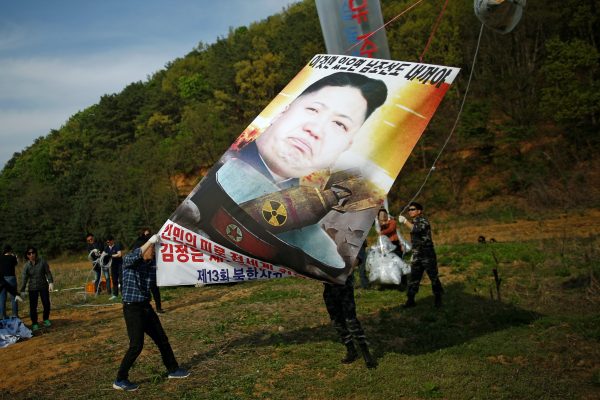Launched by North Korean defector groups based in the South, these balloons typically contain items ranging from leaflets and USB sticks containing anti-Kim regime materials to bibles, US dollars and basic humanitarian items such as socks and South Korean snacks.
Human Rights Watch is urging the South Korean parliament to drop the bill. US Congressman Chris Smith (R-NJ) said that the Tom Lantos Human Rights Commission of the US House of Representatives — which he co-chairs — would hold hearings on the law in the near future.
Yet there has been little discussion of Seoul’s explicit reasons for deeming the revisions necessary.
The law’s primary purpose is to protect the lives of the 1.12 million South Koreans who live in the border regions where the balloons are launched. They would be the first to suffer harm in the event of an armed confrontation between the two Koreas.
Though the border regions have — for the most part — experienced an uneasy peace since the end of the Korean War, the possibility of a military strike from the North is far from theoretical.
In October 2014, balloon launches directly led to exchanges of gunfire between North and South Korean troops close to a South Korean border village. While no lives were lost in that exchange, many border residents recall the earlier North Korean shelling in November 2010 of Yeonpyeong Island in the West Sea during South Korean military drills. Four South Koreans (including two civilians) were killed and 19 injured.
The launches are also undermining tourism and hurting local businesses during periods of heightened tensions. A recent survey of residents of Gyeonggi Province — part of which borders North Korea — found that 71 per cent wanted the sending of leaflets banned and 59 per cent saw the leaflets as threatening their lives.
Local governments in the border regions are also putting pressure on Seoul. In June 2020, 10 mayors and county governors from the border regions signed a collective letter urging the government to pass a law against such activities. They argued that ‘spreading leaflets to North Korea is an irresponsible act that is immediately harmful to the wishes and hopes of people in the border region who want to relieve tensions, resolve conflicts, and live a safe and peaceful life’.
Much of the international criticism of the law points out that its revision comes after months of particularly intense rhetoric from North Korea, suggesting that the Moon Jae-in government had given in to Pyongyang’s demands.
It is no doubt true that Seoul seeks to continue its policy of engagement with Pyongyang and that the balloons represent an impediment to this aim. As a former human rights lawyer, President Moon maintains the position that the nurturing of inter-Korean exchange and cooperation is a more effective means of improving North Korean human rights than the sporadic and small-scale activities of defector groups.
But the Moon government is not alone in seeking to prevent the launches. Out of 12 instances since 2008 in which South Korean authorities took measures to prohibit balloon launches, 11 occurred under the conservative Lee Myung-bak and Park Geun-hye governments. Neither of these administrations were known for their friendly disposition towards Pyongyang or for their policies of engagement.
The main departure of the current administration has been to put these restrictions on a firmer and more permanent legal basis. Given ongoing tensions between the two Koreas, the Moon government has — like its predecessors — found it necessary to weigh up norms of freedom of speech with the safety of its own citizens.
This is particularly so when the efficacy of the balloon launches is unclear.
Critics of the law have suggested that the ban will starve North Koreans of outside information. Yet the influx of information into the country in recent years occurred largely across the Sino-North Korean border rather than across the highly militarised region bordering with the South. And many of the balloons either fail to reach North Korea or do not get far enough into Northern territory to reach their intended recipients.
There is also little knowledge of what the consequences might be for individual soldiers and farmers who come across the leaflets. Given that the leaflets are often designed to be as offensive as possible to the North Korean leadership, they may put their unwitting recipients in considerable personal danger.
Observers are right to exercise scrutiny of the extent to which South Korea lives up to its professed democratic ideals. Certainly, such ideals should not be sacrificed for the sake of engagement with the North. But critics should also recognise that Seoul needs to balance these norms with the safety of all of its citizens.
Kevin Gray is Professor of International Relations at the University of Sussex.

